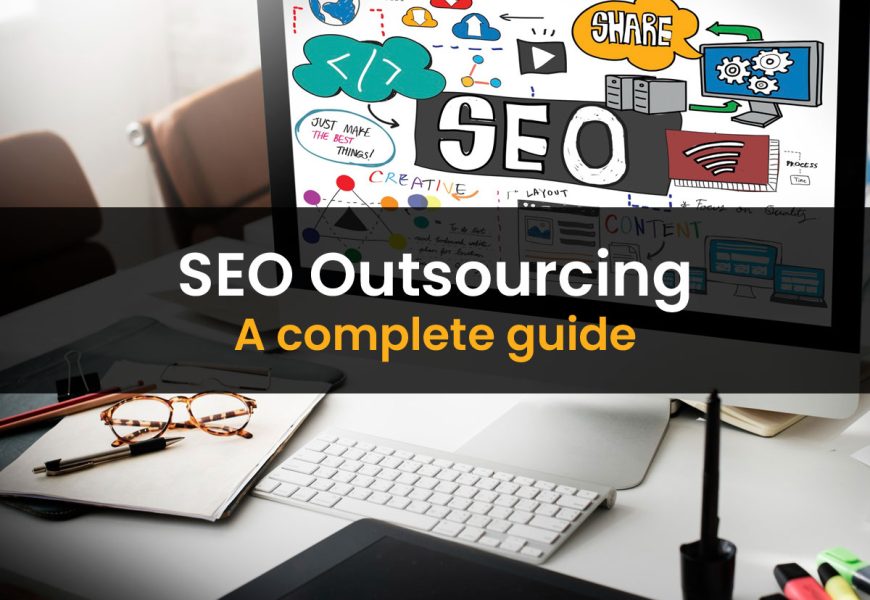If you want to grow your business, mastering search engine optimisation (SEO) is essential. According to recent survey data, 53 per cent of all trackable website traffic comes from organic search, highlighting the importance of appearing at the top of search engine results to get noticed by potential customers.
However, many small businesses struggle to manage a comprehensive SEO strategy because they lack the necessary time, skills, or expertise. SEO involves many tasks, such as keyword research, content evaluation, page optimisation, and internal linking. Without a well-rounded approach, businesses often end up with a generic web presence that fails to engage users or drive conversions.
To overcome these challenges, consider hiring an SEO consultant or agency. Outsourcing your SEO efforts can significantly enhance your online presence and help you achieve better results.
In this guide, we will explore the key benefits of outsourcing SEO and discuss why you should remain involved in the process. Additionally, we’ll identify common SEO pitfalls and provide actionable tips for choosing an SEO agency that aligns with your brand’s goals and values.
What is SEO Outsourcing?
Outsourcing SEO means hiring a dedicated agency or freelancer to help execute and potentially create your SEO strategy, with the goal of driving more organic traffic from search engines.
SEO outsourcing is particularly beneficial if your marketing team lacks the bandwidth, resources, or specialised tools needed to implement an effective SEO strategy. By partnering with SEO experts, you can leverage their expertise to improve your search rankings, increase online visibility, and drive meaningful engagement with your target audience.
How is SEO Outsourcing a Good Idea?
Creating a successful SEO strategy is complex and requires a thorough understanding of how search engines evaluate content. Companies must identify the most impactful SEO elements and continuously adjust their content to meet evolving search engine standards. This task becomes increasingly important as search engines like Google frequently update their ranking algorithms, introducing new factors like page loading speed as criteria for search result rankings.
SEO now encompasses more than just incorporating popular keywords and producing high-quality content. Brands must also focus on delivering an exceptional user experience across their digital platforms. Given these challenges, outsourcing SEO services can be a strategic decision for companies aiming to enhance their digital presence and attract a larger audience.
By outsourcing SEO, businesses can rely on industry experts to establish and implement effective strategies tailored to their goals. This approach mirrors how many companies entrust their marketing efforts to specialists, allowing them to concentrate on their core business objectives.
For small businesses and entrepreneurs, the advantages of outsourcing are significant. It saves time by eliminating the need to master SEO intricacies, test various strategies, and fine-tune results. Instead, business owners and managers can direct their efforts toward enhancing customer conversions, refining product offerings, and exploring new ideas while the SEO experts handle the rest.
Types of SEO Services
When considering outsourcing SEO services, it’s essential to weigh your company’s specific needs and budget. You have the option to outsource some or all aspects of SEO, depending on your strategic goals and resources. Below is an overview of the primary SEO activities that can be outsourced:
On-Page SEO
On-page SEO involves optimizing your webpages to enhance their visibility on search engine results pages (SERPs). This process includes updating elements such as title tags, meta descriptions, header tags, and internal linking. By improving these on-page factors, you ensure that your content aligns with search engine algorithms, making it easier for potential customers to find your site.
Off-Page SEO
Off-page SEO encompasses actions taken outside of your website to boost your domain authority and visibility in search results. This often involves link building and guest blogging, where you work to establish your site’s reputation and credibility through external endorsements and backlinks from reputable sources.
Technical SEO
Technical SEO focuses on optimising your website’s structure and performance to improve its overall visibility and user experience. This includes ensuring fast loading speeds, mobile-friendliness, and a secure browsing experience, all of which contribute to better search engine rankings and enhanced user satisfaction.
International SEO
International SEO aims to optimise your website for different countries and languages. This requires translating country-specific content, implementing language tags, and optimising for various search engines. By doing so, you can effectively reach and engage global audiences, tailoring your approach to meet the needs of diverse markets.
Local SEO
Local SEO is about increasing your website’s visibility in local search results. It involves optimising your Google Business Profile, creating content relevant to your local audience, and acquiring local reviews. This strategy helps businesses attract nearby customers and gain prominence in regional search queries.
Content SEO
Content SEO involves creating optimised content that improves your website’s visibility in SERPs. This includes conducting keyword research, developing topic clusters, and refining existing content to align with search intent. By focusing on high-quality, relevant content, you can enhance user engagement and search engine rankings.
Additional SEO Activities
Beyond these core SEO components, you can also choose to outsource specific tasks such as:
- SEO Strategy: Developing a comprehensive plan tailored to your business goals and target audience.
- SEO Audits: Conducting thorough analyses of your website to identify areas for improvement.
- Link Building: Establishing a network of quality backlinks to enhance your site’s authority.
- UX Design: Improving user experience on your website to increase engagement and conversions.
- Sitemap Optimization: Ensuring your site’s architecture is well-organized and easily navigable for search engines.
Should You Completely Outsource Your SEO?
Outsourcing your SEO strategy to an agency or consultant can be a great way to enhance your online presence and improve search engine rankings. However, there are crucial aspects of SEO that should remain under your direct control to ensure that your brand’s unique voice and goals are accurately represented.
Here are some key areas where your involvement is essential:
Keywords: Your Business’s Unique Language
While SEO experts excel at identifying high-impact keywords, you are the true authority on the core keywords that define your business and operations. You know the language that resonates with your target audience, and straying too far from these essential terms can dilute your brand’s identity. If your website attracts visitors seeking something unrelated to your business, it may lead to poor engagement. Therefore, it is vital for you to play an active role in selecting the most appropriate keywords that reflect your brand’s core values and attract the right audience.
Content: Your Brand’s Unique Voice
The content on your website is a reflection of your brand’s identity. While SEO agencies can craft targeted content that appeals to your market, certain elements of your site’s content, such as your business’s history and mission statement, are best created and managed by you. Your personal touch ensures that the content remains authentic and aligns perfectly with your brand’s voice. One gets to maintain the integrity and uniqueness of your brand’s message if one stays involved in the content creation process. This ultimately resonates better with your audience.
Relationships: Your Strategic Connections
Although an SEO provider can design a strategic framework for your online presence, they cannot replicate the personal relationships you have built with other businesses, suppliers, and partners. These relationships are the backbone of your brand’s network and provide opportunities for content sharing and collaboration that an external agency may not be able to leverage fully. You enhance your SEO efforts, which allows your content to be shared more widely within your industry network and amplifies your brand’s reach.
Brand Perspective: Your Vision and Values
Your brand’s perspective is a significant factor in your business’s success and growth. Even the most skilled SEO agency cannot fully grasp the depth of your brand’s meaning or how you want to convey your message to the world. This unique perspective drives your growth and sets you apart from competitors. While outsourcing SEO is excellent for building a solid foundation for conversion and revenue, it should be complemented by your insights and vision. Your direct involvement ensures that your brand’s values and identity remain at the forefront of your marketing efforts.
Growth Strategy: Your Path to Success
Your overall growth strategy remains your responsibility, even when you work with an SEO agency. While they can help you achieve specific objectives, such as improving your search engine rankings or increasing website traffic, you need to outline the long-term goals for your business. Where do you envision your business in a month, a year, or even five years? By defining these goals, you can work more effectively with your SEO partner to align their strategies with your vision and ensure that every step taken is a step toward achieving your business’s growth ambitions.
What Are The Common SEO Mistakes?
While every business is unique, the fundamental principles of SEO are consistent: aim to rank higher in search engines for popular keywords to increase traffic to your website. Achieving this goal is often challenging, and both businesses and SEO agencies can fall into traps that lead to costly mistakes. Here are five common SEO pitfalls to avoid:
Keyword Stuffing
One of the cardinal rules of modern SEO is to avoid keyword stuffing. This practice involves repetitively inserting the same keyword throughout your content in an attempt to improve your search ranking. However, search engines have become sophisticated enough to detect keyword stuffing and will penalise your site if they find this behaviour. Instead of stuffing your content with keywords, aim to naturally incorporate your primary keyword once per piece of content, which is generally sufficient for search engines to recognise and rank your page.
Duplicate Content
Duplicate content is another common pitfall in SEO. While having more content with keywords might seem beneficial for ranking, copying and pasting existing content or making only slight modifications to include new keywords diminishes the overall value of your website. Search engines prioritise unique and original content, so creating fresh, engaging material is always more advantageous than recycling old content. Unique content not only enhances your site’s SEO performance but also provides more value to your visitors.
Low-Quality Backlinks
Backlinks are crucial for increasing the relevance and authority of your content, but the quality of the sites you link to matters significantly. Linking to high-quality, reputable sites can enhance your SEO efforts, while connections to low-quality sites that engage in keyword stuffing or have minimal visitor traffic can harm your ranking. To improve your search engine standing, focus on building backlinks to authoritative sites that are relevant to your industry and audience.
Unoptimised Images
Images are an excellent way to capture user interest, but they need to be optimised to impact SEO positively. Start by ensuring your images are relevant and easily understandable. For instance, if you operate a construction company, choose high-quality images that clearly depict your services. Low-resolution or confusing images can deter users from staying on your site. Additionally, pay attention to the size of your images. Large or numerous images can slow down your site’s loading speed, which negatively affects user experience and search rankings. Optimise images for size without compromising quality to enhance both user engagement and SEO performance.
Muddled Meta Descriptions
Meta descriptions are brief text snippets that provide a quick summary of a page’s content. Clear and concise meta descriptions are crucial for attracting users to your site. Vague or muddled descriptions can cause users to overlook your pages. To optimise your meta descriptions, use your primary keyword and give a succinct overview of the page’s content. This helps users understand what to expect and entices them to visit your site.
Who Should You Hire: Freelancers or Agencies?
When it comes to outsourcing your SEO needs, you have the option to choose between hiring a freelance SEO specialist or partnering with an SEO agency. Both options offer unique advantages, and your decision will depend on your business requirements and goals. Both freelancers and agencies typically provide one-time services and support for long-term projects. Here’s a closer look at how they differ and what they can offer:
Freelancers
Freelancers are independent professionals who specialise in specific aspects of SEO. They usually offer services in one of two ways:
- Per Project: In this model, you and the freelancer agree on the scope of a specific SEO project. This could involve tasks such as on-page optimisation, keyword research, or technical audits. The freelancer will work on the defined project until completion, providing focused attention to the task at hand.
- Retainer Package: Freelancers also offer retainer packages, which provide you with a set number of hours each month that can be used for a variety of SEO tasks. This flexible arrangement allows you to address different SEO needs as they arise, from content updates to link building.
Freelancers typically provide specialised services rather than comprehensive SEO support. This makes them a great choice if you need help with specific tasks such as optimising product pages, performing a technical audit, or identifying keyword opportunities. Platforms like Fiverr and Upwork offer a wide range of freelance SEO services, allowing you to choose a freelancer with expertise tailored to your particular needs.
SEO Agencies
If you’re looking for a more comprehensive solution, partnering with a full-service SEO agency might be the better choice. SEO agencies consist of teams with diverse skills and expertise, covering all aspects of SEO, from technical optimisation to content creation and link building.
Here are some benefits of working with an SEO agency:
- Comprehensive Services: Agencies provide end-to-end SEO services, ensuring that all aspects of your online presence are optimised for search engines. Whether you need on-page optimisation, off-page strategies, or technical SEO improvements, an agency can cover it all.
- Access to Expertise: With a team of professionals, agencies offer a broad range of expertise and industry insights. This can be particularly beneficial if you’re aiming for a holistic approach to SEO that encompasses various strategies and tactics.
- Ongoing Support: Agencies provide ongoing support to help you navigate the ever-changing landscape of SEO. They stay updated with the latest trends and algorithm changes, ensuring that your strategies remain effective and aligned with best practices.
- Scalability: An agency can easily scale its services to match your business growth, making it a suitable choice if you anticipate expanding your SEO efforts over time.
Choosing the Right Option
Ultimately, the decision between hiring a freelancer or an SEO agency hinges on your specific needs, budget, and goals. Here are a few considerations to help you decide:
- For Targeted Tasks: If you have a limited budget and require assistance with specific SEO tasks, a freelancer can provide specialised support without the overhead of a full-service agency.
- For Comprehensive Solutions: If you’re seeking an all-encompassing SEO strategy that covers multiple facets of optimisation, an SEO agency offers a cohesive approach with access to a diverse skill set.
- For Flexibility: Freelancers offer more flexibility with retainer packages that adapt to changing needs, while agencies deliver structured and strategic long-term support.
- For Long-term Growth: If your goal is to achieve sustained growth and keep up with the evolving SEO landscape, an agency’s continuous support and expertise might be more advantageous.
In conclusion, both freelancers and SEO agencies offer valuable SEO solutions, and your choice should align with your business’s specific needs and strategic vision.
Benefits of Outsourcing SEO
Outsourcing SEO services can provide a range of advantages for businesses, whether you choose to work with a freelancer or an agency. Here are the key benefits of outsourcing your SEO needs:
Expediency
Outsourcing SEO allows you to swiftly address your company’s needs without the lengthy process of recruiting and training new talent. By leveraging external expertise, you can quickly implement effective SEO strategies and tactics. This approach is particularly beneficial for:
- Smaller Teams: Businesses with limited resources can focus on core operations while outsourcing SEO to specialists, ensuring they remain competitive without stretching their existing team too thin.
- Tight Budgets: Companies with budget constraints can outsource SEO to access expert services without the financial commitment of hiring full-time staff.
- Fast-Paced Environments: Organizations that need to optimise for SEO quickly can rely on external experts to deliver timely results and stay ahead of the competition.
- Larger Teams Seeking Specialized Assistance: Even well-established teams may require specialised SEO support to enhance their strategies or tackle specific challenges.
Outsourcing offers a flexible and efficient solution to meet various organizational needs, allowing businesses to focus on what they do best while experts handle their SEO requirements.
Expertise
Freelancers and agencies specialising in SEO possess in-depth knowledge of algorithm changes, emerging SEO techniques, and competitor analysis. Staying up-to-date with the latest trends and best practices can be challenging for in-house SEO teams, especially for smaller businesses with limited resources.
Cost-Effectiveness
Outsourcing SEO is often more cost-effective than maintaining an in-house team, which requires substantial investments in salaries, benefits, and ongoing training. With outsourcing, you pay only for the services you need, eliminating the overhead costs associated with full-time employees. This approach provides financial flexibility and enables businesses to allocate resources more efficiently.
Pitfalls of Outsourcing SEO
While outsourcing SEO offers benefits, it also comes with some challenges. Here are the main drawbacks:
Limited Control
Outsourcing SEO can mean losing some control over the strategies and tactics employed. You may not have direct oversight of day-to-day decisions, which might lead to strategies that don’t align perfectly with your brand’s vision.
To mitigate this, maintain some control by setting clear expectations and sharing important information with your SEO partner, such as:
- Audience Profiles: Provide detailed personas to ensure strategies align with your target market.
- Previous Efforts: Share past tactics and results to avoid repeating mistakes.
- Competitor Insights: Offer insights into competitors to help tailor strategies effectively.
This helps align your outsourced SEO team’s efforts with your business objectives.
Communication Gaps
Outsourcing can lead to communication issues, especially if your partner operates in a different time zone or speaks a different language. These barriers can cause misunderstandings and project delays.
To overcome this, establish clear communication channels from the start:
- Regular Meetings: Schedule consistent check-ins to discuss progress and address issues.
- Communication Tools: Use tools like Zoom and email to stay connected.
- Clear Guidelines: Define roles and deliverables to minimise confusion.
Effective communication helps bridge the gap between your in-house team and your outsourced partner.
Less Market Knowledge
External providers may lack the industry-specific knowledge needed for tailored strategies, leading to generic approaches that don’t fully address your business’s unique needs.
To avoid this, choose an SEO partner with experience in your industry. Look for companies that can demonstrate successful campaigns for similar businesses.
How to Select a Good Agency for SEO Outsourcing?
Finding the right SEO consultant or agency can make a significant difference in your online presence, but knowing where to start can be tricky. The key? Asking the right questions. Unsure which ones to focus on? We’ve got you covered. Let’s break down the essential questions to ask before making your choice.
What Sets You Apart?
While the fundamentals of SEO are consistent, the strategies can vary widely. Some companies might emphasize specific metrics, while others prefer a more organic or balanced approach. It’s crucial to ask potential agencies or consultants what distinguishes them from the competition. What unique strategies or insights can they bring to the table to boost your rankings and drive traffic?
Pro tip: After listening to their answer, do a quick check on their SEO rankings. If they’re not ranking well for their own targeted keywords, it might be a red flag.
Can You Walk Me Through Your Process?
A reputable SEO provider should clearly explain their process in simple, understandable terms. If they bombard you with jargon or make grand promises without backing them up, it might be a sign to explore other options. Clarity and transparency are key indicators of a trustworthy partner.
What Tools Do You Use?
SEO tools are vital for tracking and optimizing your online presence. Ask about the specific tools they use—whether it’s popular ones like Ahrefs, SEMRush, or Moz Pro, or their proprietary tools. Understanding why they use these tools and how they integrate them into their strategy can give you confidence in their approach.
How Long Before I See Results?
Be cautious of anyone who guarantees immediate results. SEO is a gradual process that depends on search engines crawling your site and evaluating changes. Typically, you can expect to see significant results within 4 to 6 months. Patience is key, and a good consultant will set realistic expectations.
What Metrics Do You Track?
Metrics are the heartbeat of SEO. Key indicators include keyword rankings, organic search volumes, bounce rates, click-through rates, and lead conversions. Ask what metrics they prioritize and how they interpret these numbers. Understanding their approach to metrics will help you gauge the effectiveness of their strategy.
How Often Will You Report on Progress?
Regular reporting is crucial for tracking the success of your SEO efforts. Reporting frequency can vary—some companies provide weekly updates, while others may report every other week or monthly. Choose a reporting schedule that suits your needs, but keep in mind that more frequent reports can help you catch issues early and adjust strategies as needed.
Can You Provide References?
A solid track record speaks volumes. Ask for references or case studies demonstrating how they’ve helped other brands improve their SEO. If they can’t provide concrete examples or rely more on promises than past performance, proceed cautiously.
FAQs on SEO Outsourcing
Is outsourcing SEO worth it?
Yes, outsourcing SEO is often more cost-effective than managing it in-house. By outsourcing, you get access to experienced SEO professionals and comprehensive services, including talent, tools, and reporting. This can help revitalize stalled SEO performance and deliver better results.
What are the 3 types of SEO services?
The three types of SEO services are:
- On-Page SEO: This involves optimizing the content and HTML source code on your website to improve visibility in search engines.
- Off-Page SEO: These are actions taken outside your website, such as backlinks, to improve your site’s search engine ranking.
- Technical SEO: This focuses on improving your website's infrastructure, like site speed and mobile-friendliness, to help search engines crawl and index your site effectively.
Is SEO still profitable?
Absolutely. SEO remains a smart investment for attracting new business and increasing brand awareness. Although it may take more time and effort than paid advertising, SEO is an excellent long-term strategy that complements your existing marketing efforts and strengthens customer relationships.
What are the 3 C's of SEO?
The 3 C's of SEO are content, code, and credibility:
- Content: Creating valuable and relevant content for your audience.
- Code: Ensuring your website’s code is optimised for search engines.
- Credibility: Building trust and authority through high-quality backlinks and a strong online presence.















